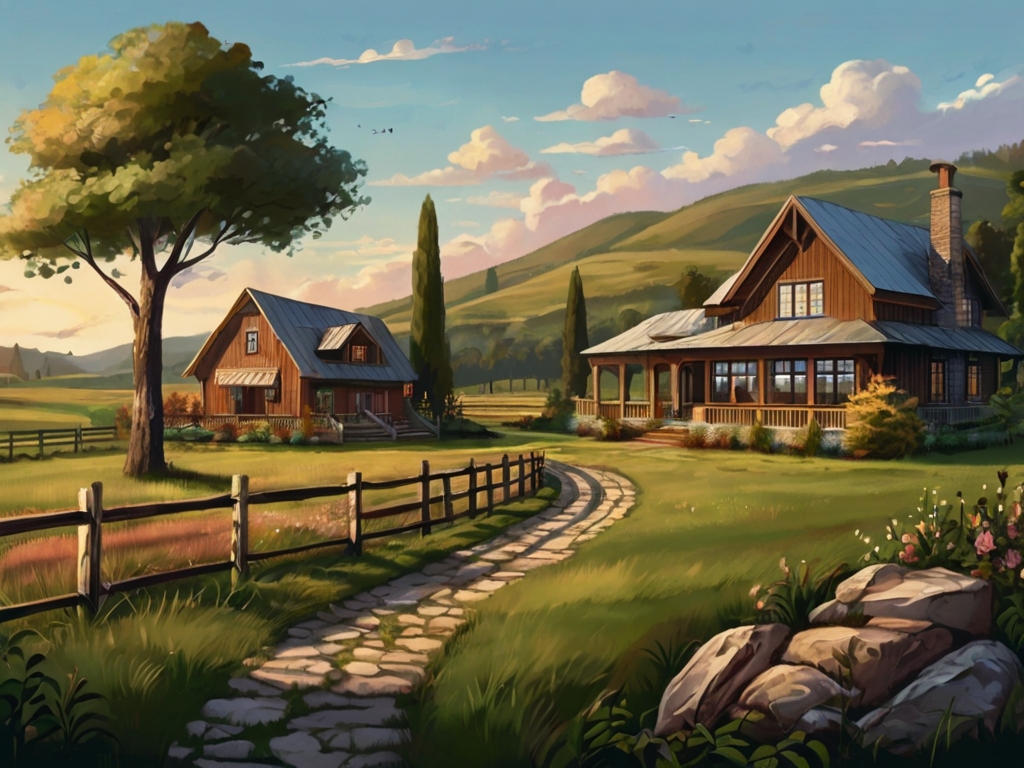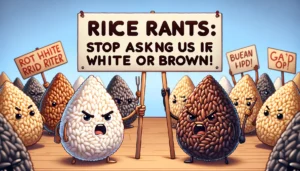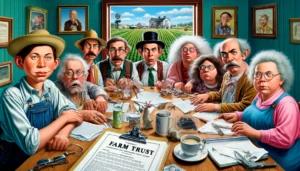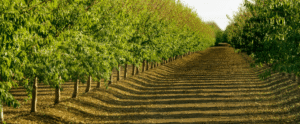
The Power of Acreage for Wealth and Success 1.jpg
The Great Acreage Accumulation: Unearthing the Absurdities of Land as a Status Symbol
A satirical investigation into how acres of land have become the new measure of success, complete with expert opinions, societal observations, and a sprinkle of absurdity.
Introduction: In a world where success is often measured by tangible assets, nothing screams “I’ve made it” quite like owning vast expanses of land. But is there more to this acreage obsession than meets the eye? Let’s dig into the dirt of this societal phenomenon.
The Suburban Lawn Wars: In the heart of suburbia, the lawn is the battleground where status is won or lost. Sociologist Dr. Greenway observes, “It’s not just grass; it’s a socio-economic statement.” A recent study by the University of Suburbia found that 78% of suburbanites feel lawn envy, and 65% admit to making landscaping decisions based on neighbors’ yards.

Rural Prestige and the Tractor Trophy: Moving to the countryside, acreage becomes a symbol of not just wealth, but identity. Agricultural expert John Barley notes, “You’re not just farming land; you’re cultivating status.” A survey by the Rural Life Institute revealed that 85% of rural landowners view their land size as a key indicator of success.
The Ultra-Wealthy’s Private Kingdoms: For the ultra-rich, acreage allows for the creation of personal empires. Billionaire Bob Landlord told us, “Why have a home when you can have a domain?” Reports indicate a rising trend in billionaires constructing private amusement parks, wildlife reserves, and even entire villages on their properties.
The Environmental Angle: Environmentalists warn of the downside to this acreage race. Eco-warrior Lily Green says, “We’re turning habitats into status symbols.” Data shows a 30% increase in land converted to luxury estates in the past decade, sparking debates about sustainability and conservation.
Cultural Commentary: Culturally, the acreage obsession reflects deeper societal values and anxieties. Historian Dr. Past explains, “Land has always been a measure of power. Today, it’s also a measure of personal worth.” Public polls suggest that while many aspire to land ownership, there’s growing skepticism about the relentless pursuit of more.
Conclusion: While owning land can be a source of pride and joy, the race for more raises questions about values, sustainability, and what we consider true success. As we navigate our societal landscape, perhaps it’s worth considering not just the quantity of land we desire but the quality of life it brings.
10 Accourage Observations with Additional Commentary and Insights
1. The Monopoly Mantra
In the game of Monopoly, owning properties like Boardwalk and Park Place isn’t just a strategy; it’s a miniature version of real-world wealth flaunting. Similarly, in life, acreage becomes a board where the wealthy plant their flags, signaling their economic prowess. This phenomenon isn’t confined to rural barons; urban elites, too, vie for their slice of the land pie, even if it’s just a penthouse with a view. The mantra “bigger is better” isn’t just about homes; it’s about owning pieces of the Earth itself, a tangible asset that screams success louder than any luxury car or designer handbag ever could. The parallels between the game and reality are uncanny, with individuals strategizing, trading, and sometimes even betraying to expand their land holdings. In this grand game of terrestrial accumulation, it’s not just about having a place to call home; it’s about having a domain that others covet, a kingdom in a world where space is the ultimate luxury.
2. Lawn Size Envy
The suburban lawn has evolved from a simple patch of grass to a full-blown status symbol. The size and health of one’s lawn are now directly proportional to their social standing in the neighborhood. It’s a green, lush battleground where neighbors compete silently, each trying to outdo the other with more elaborate landscaping, exotic plant species, and meticulously designed garden features. Lawn care has transformed from a mundane chore to a strategic endeavor, with homeowners investing in high-end mowers, hiring landscape architects, and even using drone technology to achieve aerial symmetry. This lawn size envy isn’t just about aesthetics; it’s a non-verbal communication of wealth, taste, and one’s dedication to maintaining an image of perfection. It’s a silent yet loud declaration of “I’m doing better than you,” a grassy gauge of success that reflects deeper societal values around materialism and image.
3. Farmville Fantasies
The Farmville craze brought the pastoral dream into digital reality, allowing millions to manage virtual lands and revel in the joys of digital agriculture. This virtual farming tapped into a deep-seated human desire to connect with the land, even if through a screen. Players meticulously planned their farms, showcasing their success through the variety of crops and the expansiveness of their virtual estates. It was a pixelated portrayal of agricultural achievement, where the size of your digital domain was a badge of honor, a testament to your virtual farming prowess. The game’s popularity underscores a broader cultural fascination with land ownership, albeit in a simplified, gamified form. It mirrors our societal admiration for acreage as a marker of success, translating the age-old allure of fertile, sprawling fields into clicks and taps on a screen.
4. Golf Course Galore
For the elite, having a private golf course is the ultimate land flex, turning leisure into a display of landownership. These manicured greens are not just for sport; they’re a symbol of having reached a pinnacle of success where one can literally play games on their own land. The presence of a golf course on one’s property isn’t just about love for the game; it’s about owning enough land that you can designate a considerable chunk of it for entertainment. It’s a world where business deals are made, and social hierarchies are established, all under the guise of a friendly game. The golf course becomes a verdant venue where power is displayed, relationships are cultivated, and one’s status is underscored with every swing of the club.
5. The Rural-Urban Divide
In the urban jungle, space is a rare commodity. A balcony can be a luxury, and a small yard is an oasis. In contrast, rural landowners measure their domains in acres, not square feet. This divide is not just physical but symbolic, representing a rift in lifestyles, values, and indicators of success. While urbanites might covet efficiency and proximity to amenities, rural residents pride themselves on expansiveness and connection to nature. The rural-urban divide is a reflection of differing aspirations and definitions of success, where the amount of land one owns or aspires to own signifies differing priorities and, often, a different pace and quality of life.
6. DIY Disaster Zones
The more land you own, the more ambitious your home improvement projects become. With acres at their disposal, landowners transform into weekend warriors, taking on projects that often exceed their skills or understanding. These DIY endeavors can range from building a gazebo to attempting to erect a personal wind turbine. The results are often mixed, leading to half-finished structures or overly ambitious gardens that revert to the wild. Yet, these disaster zones are worn as badges of honor, testaments to the try-anything spirit of the land-rich. They reflect a peculiar aspect of human nature: the belief that with enough land, any dream can be materialized, no matter how impractical or ill-advised.
7. Acreage Apps
In a world obsessed with connectivity, why not have an app that connects people to potential land purchases with a swipe? Acreage Apps could revolutionize how we view land transactions, making them as easy as finding a date for Friday night. Imagine swiping right on a charming little meadow or a rustic woodland plot. It’s a satirical nod to our society’s need for convenience and immediacy, even in matters as significant and traditional as land ownership. This concept also pokes fun at our tendency to digitize every aspect of our lives, reducing complex decisions to simple gestures on a screen.
8. Pet Kingdoms
For some, acreage isn’t just about space; it’s about creating kingdoms for their pets. From designer dog parks to feline sanctuaries, the affluent use their land to provide lavish lifestyles for their pets, often mirroring human luxury. These pet kingdoms are not just about pampering animals; they’re about showcasing the owner’s wealth and sometimes, eccentricity. It’s a humorous yet telling reflection of how pet ownership can mirror human desires for status, comfort, and dominion, with our furry friends standing in as proxies for our own indulgences and aspirations.
9. The Great Organic Oasis
In the world of acreage as a status symbol, the organic garden stands out as a beacon of virtue signaling. Owning enough land to grow your own food is one thing, but curating an organic oasis is quite another. It’s a statement that you’re not just wealthy; you’re conscientiously wealthy. These gardens are meticulously crafted to not just produce food, but to project an image of eco-consciousness and self-sufficiency. They’re a blend of luxury and morality, where the owner can bask in the dual glow of abundance and environmentalism. This trend underscores a broader societal shift towards valuing not just what we have, but how it aligns with broader ethical and environmental standards.
10. Land Hoarding
Land hoarding isn’t just about having space; it’s about having power. The more land you accumulate, the more you control, and the more you can influence. It’s a tangible manifestation of wealth that can’t be easily hidden or understated. This hoarding behavior taps into a primal instinct to claim territory, but in a modern context, it’s layered with implications about resource distribution, environmental stewardship, and social equity. It’s a rich area for satire because it highlights the absurdity of excess in a world where many lack basic resources. The hoarder’s land isn’t just a personal asset; it’s a societal statement, a piece of the Earth claimed not just for use, but for the sake of possession itself.
By expanding on these observations, we delve deeper into the nuances and absurdities of how land ownership is perceived and pursued in modern society, offering a richer, more textured satirical commentary.
Disclaimer: This piece is a satirical exploration, blending humor with observation to reflect on societal trends. No billionaires were offended in the making of this article (we hope). Remember, it’s all in good fun – and not an inch of real estate was harmed in the process.
Originally posted 2020-03-30 11:19:24.
Originally Published at FarmerCowboy.com
2024-11-07 20:30:36
Karl Hoffman is a distinguished agriculturalist with over four decades of experience in sustainable farming practices. He holds a Ph.D. in Agronomy from Cornell University and has made significant contributions as a professor at Iowa State University. Hoffman’s groundbreaking research on integrated pest management and soil health has revolutionized modern agriculture. As a respected farm journalist, his column “Field Notes with Karl Hoffman” and his blog “The Modern Farmer” provide insightful, practical advice to a global audience. Hoffman’s work with the USDA and the United Nations FAO has enhanced food security worldwide. His awards include the USDA’s Distinguished Service Award and the World Food Prize, reflecting his profound impact on agriculture and sustainability.




